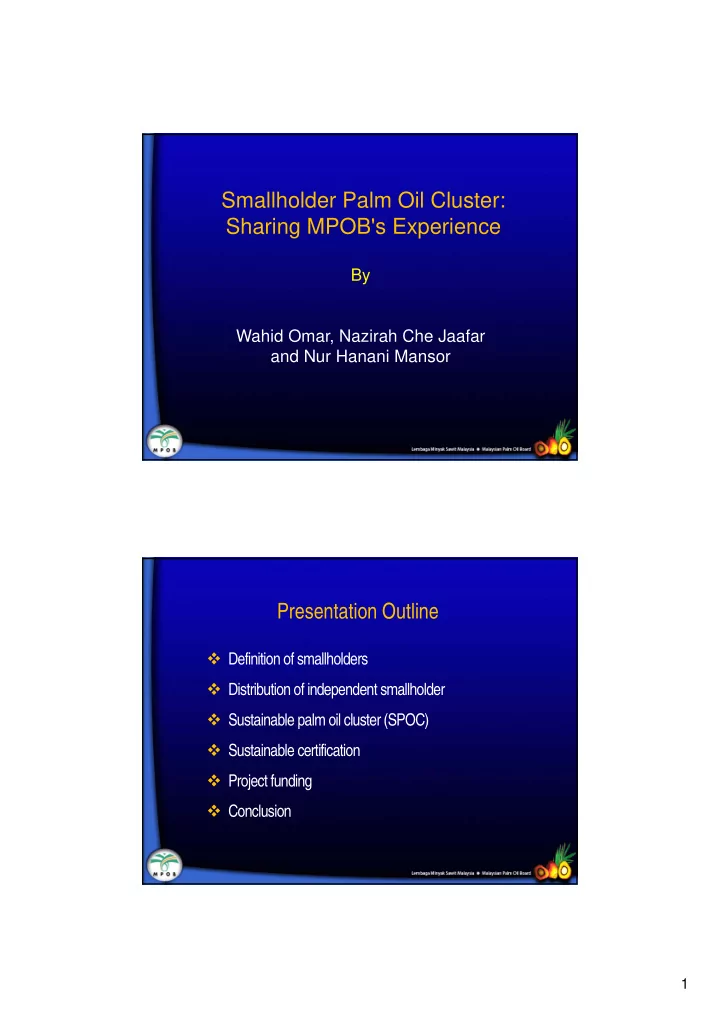

Smallholder Palm Oil Cluster: Sharing MPOB's Experience By Wahid Omar, Nazirah Che Jaafar and Nur Hanani Mansor 1 Presentation Outline Definition of smallholders Distribution of independent smallholder Sustainable palm oil cluster (SPOC) Sustainable certification Project funding Conclusion 1
Definition of Smallholder Oil palm grower that owned land <40.46 ha (100 acres) Organized smallholder – smallholder managed by agencies Independent smallholder - smallholder that managed and financed their own oil palm farm Malaysian Oil Palm Area 2011 (5,000,109 ha) Estate Organised Smallholder Independent Smallholder 14% 25% 61% 4 2
Organized Smallholder Area 2011 (1,264,815 ha) FELDA FELCRA RISDA State Schemes 25% 6% 56% 13% 5 Distribution of Independent Smallholder 2011 State Smallholder (No) Oil Palm Area (ha) Johor 65,813 201,018 Kedah 4,098 21,091 Kelantan 718 3,210 Melaka 1,936 9,379 Negeri Sembilan 3,693 19,334 Pahang 7,790 36,350 Perak 32,992 98,280 Perlis 8 58 Pulau Pinang 1,553 8,486 Selangor 17,845 38,543 Terengganu 1,895 8,413 Peninsular 138,341 444,163 Sabah 24,852 170,643 Sarawak 11,982 66,166 6 TOTAL 175,175 680,972 3
Profiles of Malaysian Independent Smallholder Characteristic Profiles Age Average 54.6 yrs old, 66.6% > 50 yrs old Primary (49.6%), secondary (34.1%), tertiary Education (8.9%) and 7.4% education less Family size Average 5.6 persons Full-time (55.6%), part-time (28.9%), absentee Farm employment owner (15.5%) Farm size Average 2.6 ha, < 4ha (88.9%) Source of seedling Govt. (50.4%), private (24.4%), estate (14.1%) Average FFB Yield 15 t/ha/year Source : Idris (2005) Sustainable Palm Oil Cluster (SPOC) • SPOC was launched by Minister of MPIC on 30 th November 2009 • Components of SPOC Certification of GAP / MPOB General Meeting at Saratok, Sarawak on 1 Dec 2010 CoP / RSPO Establishment of cooperative as vehicle for group activities e.g.. FFB marketing, fertilizer credits etc. Smallholders Good Agricultural Practices (GAP) survey 4
GAP / CoP Certification • Objectives: To encourage oil palm sustainable management To increase FFB production and quality GAP training for smallholders To increase smallholders income To improve smallholders technical knowhow SPOC Framework INCREASE SMALLHOLDER INCOME Cooperative Certification Group activities Improve smallholders oil Additional income palm technology SPOC Reduce production cost Increase FFB productivity Business opportunity and quality Sustain oil palm productivity Smallholder Grouping Individual Smallholder 5
SPOC ESTABLISHMENT 2012 Perak Daerah Selama Sabah Terengganu Daerah Teluk Intan Daerah Dungun Daerah Beluran Daerah Kinabatangan ● Pahang ● Daerah Kunak Daerah Temerloh ● ● ● Daerah Tongod ● Daerah Maran ● ● Daerah Keningau Daerah Bera ● ● Daerah Tawau ● Melaka ● Sarawak ● ● Daerah Jasin Daerah Bakong Marudi ● Johor Daerah Saratok ● Kluang Utara ● Daerah Selangau ● ● ● ● Daerah Yong Peng Daerah Belaga ● Selangor Daerah Kulaijaya Daerah Serian ● Kuala Selangor Selatan Kuala Langat SPOC (N0.) Smallholder (N0.) Area (Ha) 23 42,397 170,229 Extension Officers (TUNAS) TUNAS (N0.) Peninsular Sabah Sarawak 156 51 56 12 6
Certification Activities • GAP Individual certification Filed visit & document checking Training • CoP / RSPO Group certification Certification briefing GAP auditing Membership registration Identification of GAP gaps Formation of management unit Training Internal auditing External auditing Awarding of certificate Smallholder's documents GAP Certification 1. Land ownership 2. Steep land management 3. Planting system 4. Planting density 5. Harvesting path 6. Drainage system Steep land management 7. Water-table on peat 8. Farm land cover 9. Palm base maintenance 10. Pest control 7
GAP Certification 12. Oil palm trunk maintenance 13. Oil palm nutrition 14. Fertilizer management 15. Frond number 16. Pruned frond stacking 17. Ganoderma control 18. Soil and water conservation Oil palm farm 19. Harvesting operations 20. Oil palm land utilization 21. Farm record book 15 Code of Good Agricultural Practices for the Oil Palm Estates and Smallholdings 1. Traceability 2. Record keeping and internal audit 3. Planting materials 4. Site history and site management 5. Soil and substrate management 6. Fertiliser management 7. Irrigation and fertigation 8. Crop protection 8
Code of Good Agricultural Practices for the Oil Palm Estates and Smallholdings 9. Harvesting 10. Post-harvest handling 11. By-products, waste and pollution management 12. Worker health, safety and welfare 13. Environmental issues Soil and water conservation measures : 14. Record of complaints i. Legume cover crops ii. Terraces 15. Legal requirements Formation of Cooperative 1. Selection of SPOC 2. Briefing on cooperative 3. Getting Malaysian Cooperative Commission permission to form cooperative 4. Formation of committee Cooperative briefing 5. Pre-general meeting 6. Registration 9
Project Funding • Short term Grant from government MPOB operational budget • Long term Funded by cooperative • Government assistance Oil palm replanting New planting, replanting and certification Estimated Cost of Certification per SPOC No Item Cost (RM) 1 Pre-survey on GAP 5,000 2 Smallholders training 12,000 3 Assistance to improve GAP 48,000 4 Audit 70,000 5 Incidental cost 6,000 Total 141,000 Note : Based on SPOC Telupid, Sabah 10
Conclusion Independent smallholders produced low FFB production due to small land holding, lack of capital, limited technology knowhow and not practicing GAP. SPOC was established to organize the smallholders into small groups to enable them to work together in improving their oil palm productivity and incomes. MPOB’s extension officers (TUNAS) are organizing the smallholders, establishing the SPOCs and cooperatives and conducting training to improve smallholders GAP. Conclusion Certifications will identify the unsustainable practices and these information will be used for programming the smallholder trainings The cooperative management can be a management unit for the CoP and RSPO group certification as well as generating revenue for the SPOC. 11
THANK YOU 12
Recommend
More recommend